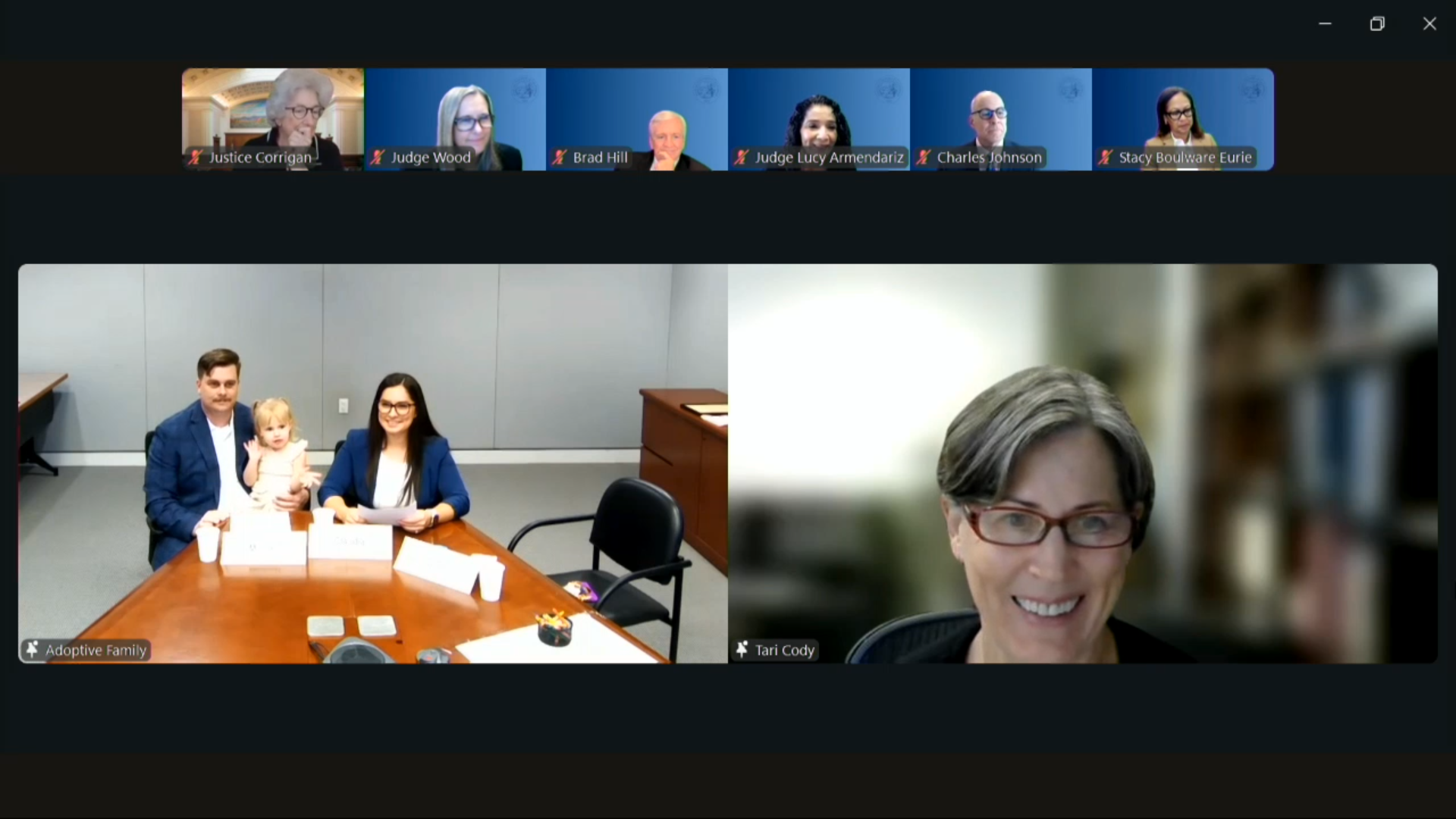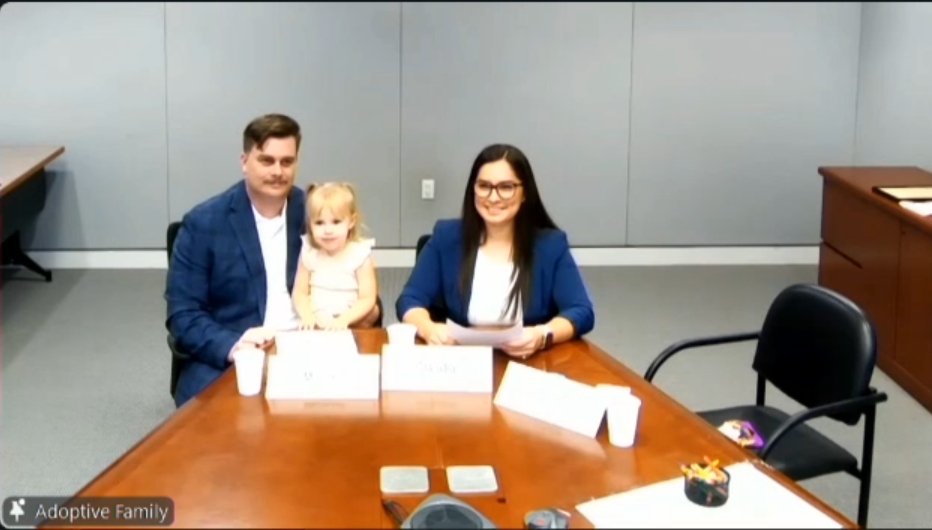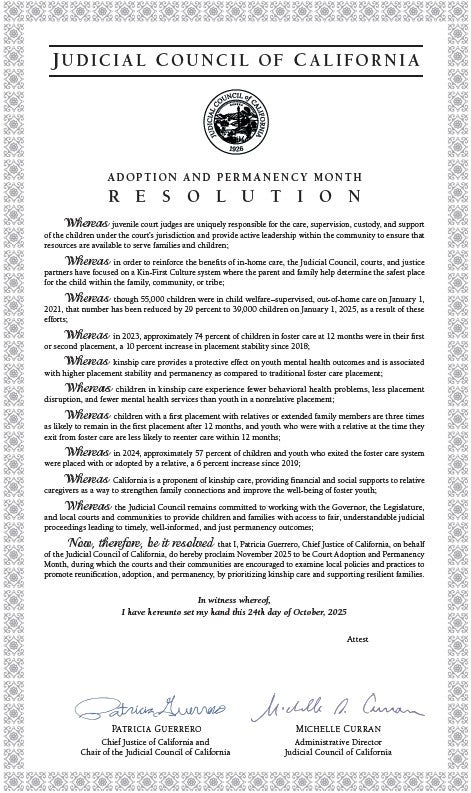Numbers Show the Benefits When Children Adopted by Extended Family Members
VIDEOCONFERENCE—The Judicial Council at its October 24 business meeting heard a report that a “kin-first culture”—a system that prioritizes placing children with their extended family network—results in fewer behavioral health problems, less placement disruption, and requires fewer mental health services than a nonrelative placement.
“Foster homes are ready, willing, and able to take in children who need care,” said Justice Tari Cody, cochair of the council’s Family and Juvenile Law Advisory Committee. “But that often involves placing them with strangers. We’ve realized we need to focus on reducing trauma, and based on data and research, we can do that by placing children with family.”
For example, the report showed:
- Children who are first placed with relatives or extended family members are three times as likely to remain there after 12 months
- 70% of youth placed with relatives are also with their entire sibling set, compared to 44% of youth placed with nonrelatives
- Youth who are with a relative at the time they exit from foster care are also less likely to reenter care within 12 months
The council also heard from two former foster youth who, informed by their own experiences in care, made the decision to adopt a family member’s child. Council members heard about their journey through the adoptive process and the importance of having a forever family.
“Our daughter will grow up knowing where she belongs,” said Claudia, one of the adoptive parents who shared their stories at the council meeting. “She will never have to question if she’s wanted, if she’s loved, or if she has a home. And that’s what permanency is really about—giving children what every single one of us deserves, a family that’s not temporary.”
In addition, the council proclaimed November to be Court Adoption and Permanency Month. The acknowledgement highlights the importance of permanency and the council’s efforts to improve the court adoption process, which include:
- Providing education and technical assistance
- Support and oversight of the 11,000 active Court Appointed Special Advocates (CASA) volunteers providing services to 13,000 children and youth statewide
- Expansion of resources for court-appointed counsel for children in foster care and their parents
New and Revised Court Rules and Forms
The council approved 281 new and revised court rules and forms in the areas of civil, criminal, juvenile, family law, conservatorships, unlawful detainer, protective orders, appellate procedures, and access and fairness. The revisions help conform to recent changes in the law and increase the efficiency of the court process.
“The proposals represent the work of 10 separate advisory committees,” said Judge Tamara Wood, vice-chair of the council’s Rules Committee. “The proposals received approximately 300 comments from internal and external stakeholders. All comments are carefully considered by the advisory committees as they refine the proposals to prepare the materials for the council.”
For example, new forms will make it easier for courts to collect information about whether a person subject to a restraining order has firearms, firearm parts, and ammunition. For each item listed, the forms allow the court to record whether the restrained person submitted proof that they complied with a relinquishment order, and if not, the form facilitates notification of law enforcement and the prosecutor.
In addition, a new rule of court implements legislation that requires superior courts to allow anyone participating in court proceedings a reasonable amount of break time to express breast milk for an infant, and another rule authorizes remote participation by judges and litigants in appellate division oral argument. Watch
Other Items on Council Meeting Agenda:
Funding for CARE Act Legal Representation: The council approved CARE Act funding for the Legal Services Trust Fund Commission of the State Bar of California so it can distribute it to qualified legal services projects and public defender offices to provide legal counsel for representation in CARE Act proceedings, as well as training and technical assistance to these legal providers.
Increased Funding for Sargent Shriver Civil Counsel Program: The council approved additional funding to current Shriver projects to expand and sustain legal representation and court services for low-income litigants involved in housing and other civil cases.
New and Revised Criminal Jury Instructions: The council approved for publication new and revised criminal jury instructions to keep the instructions current with statutory and case authority.
The complete meeting agenda and council reports are posted to the California Courts Meeting Information Center—an archived webcast of today’s meeting will be posted to the center as soon as it is available.




